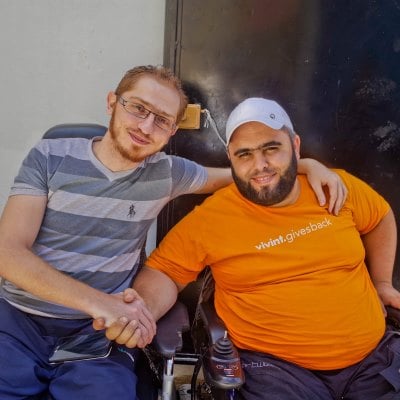Every year around the world, more than 250,000 people suffer spinal cord injuries that can cause total or partial paralysis of the limbs and trunk.
Eric Weerts, Handicap International’s emergency and rehabilitation expert explains: "In more than nine out of ten cases, the causes of these injuries - road traffic accidents, falls or acts of violence – are preventable, and they can lead to serious disabilities, or even premature death."
"People with disabilities need to overcome multiple challenges, dealing with access to rehabilitation care, which is not always of a high standard, education or employment, and social inclusion. They also need to deal with the trauma of their accident: in many cases, the people affected suddenly find themselves disabled. It’s very hard for them and their friends and family to accept it."
Preventing accidents and providing appropriate care
Handicap International has been working alongside people with spinal injuries since 1989.
"We conduct risk prevention actions to help people avoid accidents that cause spinal cord injuries, and their consequences. For instance we have been training former road accident victims with spinal cord injuries to raise the awareness of students on road safety issues,” explains Eric.
At the request of national health authorities, Handicap International also sets up adapted care systems to provide people with spinal cord injuries with rehabilitation sessions and psychosocial support, both for the injured person and their families. The organisation also promotes the inclusion of people with spinal cord injuries in society and raises the awareness of spinal cord care providers in order to strengthen inclusion.
Care management in war zones
Handicap International, in partnership with the International Spinal Cord Society (ISCOS), also provides response in emergency and conflict situations.
“Too often, we find that basic civil protection standards are not applied in war zones. In addition to common injuries, such as fractures, many civilian victims of attacks suffer spinal cord injuries. Many people with disabilities do not benefit from appropriate care management, and their immediate needs, such as health and rehabilitation, or their more complex requirements, like pain management, incontinence and loss of mobility, are not met," explains Eric.
"We are currently working to determine care-management standards criteria for the most vulnerable people in emergency situations. This is one of our priorities."
25 years of action
Rehabilitation centres
?Handicap International has more than 25 years of experience in setting up rehabilitation centres for people with spinal cord injuries and in the care management of victims. These initiatives include a rehabilitation centre for people with spinal cord injuries in Battambang, Cambodia, and a rehabilitation centre in Ho Chi Minh, Vietnam.
Development of a national programme and care models
To increase the autonomy of local teams, Handicap International trains healthcare providers so that they can provide care to people with spinal cord injuries and open appropriate centres. In Vietnam, for example, the organisation has created, from Ho Chi Minh, a national spinal cord injury care management programme, which includes nine rehabilitation centres. This programme is part of the national health policy. This model, which aims at decentralising care to make it accessible for all, has provided Vietnam’s neighbours with an example of good practice and a technical resource .
Helping casualties of natural disasters
Handicap International has provided rehabilitation care for people with spinal cord injuries following earthquakes in Turkey, Pakistan, China, Haiti and Nepal. It has also worked to strengthen their social inclusion and ensure they are included in the reconstruction process, by enforcing their right to financial compensation, ensuring the accessibility of their homes, etc. The organisation has also raised awareness of other humanitarian organisations to ensure their services are accessible to people with spinal cord injuries.






